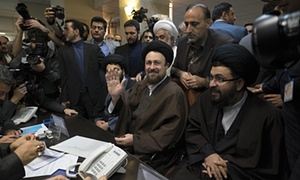December 25, 2015

The grandson of Ayatollah Khomeini, Hassan Khomeini, has registered to run for a seat in the Assembly of Experts, the body that chooses the Supreme Leader when that post falls vacant.
Hassan, 43, thus becomes the first relative of the founder of the Islamic Republic to seek to run for elective office.
His registration has sparked interest in the Assembly elections, which are normally a somnolent affair.
His registration has irritated many on the far right as Hassan Khomeini—like most of the Khomeini family—is a strong supporter of the Reformist movement. Many see Hassan’s entry into politics as key to any hopes of shifting the regime away from the controlling hands of hardliners.
With both of Ayatollah Khomeini’s sons now deceased, Hassan is the senior member of the family.
News reports said Hassan went to see Supreme Leader Ali Khamenehi last week to seek his permission to run. The reports quoted an anonymous source as reporting that Khamenehi said, “There is no problem [with your candidacy], only be careful not to besmirch the Khomeini name and respect.”
After filing his papers, Khomeini told reporters, “Some groups welcomed my candidacy. Other criticized my candidacy. And some regard it as a rift in society’s atmosphere. They are wrong.”
Others were harsher. The ultra-rightwing daily Kayhan asserted that the only support Hassan would find would be from the foreign media.
This week has been the registration window for candidates who wish to run for the Assembly of Experts and the Majlis. Both elections will be held February 26.
Registration ended this week after the Iran Times went to press—on Wednesday for the Assembly and on Friday for the Majlis.
The filed applications now will be reviewed by a variety of bodies, ending with the Council of Guardians, which will decide whose names will go on the ballot and announce the approved list early in February. No one not approved by the 12-man Council of Guardians can be elected.
Former President Ali-Akbar Rafsanjani and current President Rohani are both members of the current Assembly and both filed for re-election. With Khomeini, they could form a strong core for more moderate positions within the Assembly, which is currently under the thumb of the far right. Last year, it elected Ayatollah Mohammad Yazdi, a hardliner, as its chair.
The first step, however, is the national election. Many more moderates must register and be approved as candidates by the Council of Guardians for the moderates and Reformists to have any chance of seizing the majority. Candidates for the Assembly have never run on slates before. But moderates and Reformists are going to have to figure out some way to convey that they are moderates and Reformists to the voters.
The young Khomeini started life with more interest in soccer than the Qoran. When he reached 21, his grandfather insisted he go to Qom to study theology.
In a meeting with soccer players last week, Hassan said, “I was good on defense and, if I had continued, I might have achieved something.”
Yasser Mirdamadi, a researcher in philosophy and religious studies, has followed Hassan’s public speeches. He told Reuters, “Hassan Khomeini is promoting the modern and democratic side of his grandfather’s legacy and stays silent on the dark, authoritarian side. He wants to show that the real Khomeini respects the rights of all groups and that the totalitarian side was a temporary necessity during the early years of the revolution.”
A relative described the younger Khomeini as calm, pragmatic and non-confrontational. “Hassan Khomeini is not as radical and revolutionary as his grandfather. And that is his main strength,” he told Reuters.
Adding some spice to the registration, a woman, Esmat Savadi, has registered to run for the Assembly. She holds a doctorate in Islamic jurisprudence from Mashhad Open University.
The rules do not prohibit women as candidates for the Assembly. The criteria only require extensive knowledge of Islamic jurisprudence and current and social affairs as well as a clean criminal record.






















